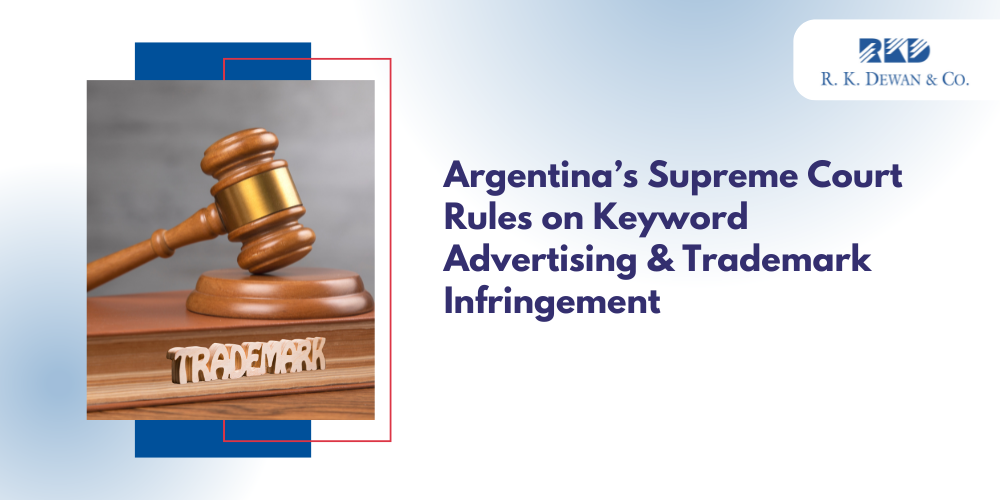In a recent landmark decision, the Supreme Court of Justice of Argentina provided clarity on the legality of using well-known trademarks as keywords in Google Ads. In the case of Organización Veraz SA v. Open Discovery SA, the Court held that such use does not automatically amount to trademark infringement or unfair competition. Instead, liability arises only if the use causes consumer confusion or falsely implies an association with the trademark owner.
The dispute arose when Organización Veraz, a credit reporting agency, sued Open Discovery, a competitor, for unauthorized use of its trademarks “VERAZ” and “ORGANIZACIÓN VERAZ” as keywords in Google’s advertising system. Organización Veraz alleged that this practice enabled Open Discovery to appear prominently in search results when users searched for “VERAZ,” misleading consumers and diverting business in a manner that exploited the plaintiff’s reputation.

We do not claim any copyright in the above images. The same have been reproduced for academic and representational purposes only.
In the initial proceedings, the lower court ruled in favor of Organización Veraz, concluding that Open Discovery’s use of its competitor’s trademark for advertising purposes constituted trademark infringement. The Federal Civil and Commercial Court upheld this decision in 2018, ordering Open Discovery to cease using the trademarks and to pay $3,336,468 in damages. The Appellate Court particularly emphasized that “VERAZ” had acquired significant reputation in the market and that consumers directly associated the term with the plaintiff’s commercial reports. Given that Open Discovery was a late entrant in the same industry, its keyword strategy was deemed to amount to misappropriation of goodwill and unfair competition.
Following the rejection of its extraordinary appeal, Open Discovery appealed to the Supreme Court, contending that the term “VERAZ” had become generic within the credit reporting industry & that the same was common-to-trade. The company further contended that its keyword advertising did not create confusion among consumers or provide an unfair competitive advantage.
Organización Veraz countered stating that the analysis should focus on the advertiser’s intent in purchasing the keyword. By bidding on “VERAZ,” Open Discovery sought to benefit from & freeride on the brand’s established reputation. It was further contended that, when an identical trademark is used for identical services, confusion should be presumed since it created an implied association. From a consumer’s standpoint, such advertising was subliminal, comparative, and misleading, thereby constituting trademark infringement.
Trademark Infringement: Supreme Court’s Landmark Ruling
The Supreme Court, in a majority ruling, overturned the appellate court’s decision and observed that using a well-known trademark as a keyword in online advertising constitutes infringement only if it results in consumer confusion or falsely implies an association with the trademark owner.
Trademarks in Argentina are governed under Trademark Law No. 22,362, (as amended by Law No. 27,444 of May 30, 2018), together with its regulatory decree No. 242/2019 (the “Trademark Law”), which aligned local trademark practice to international standards. The decision of the Apex Court outlined several key principles such as:
- The Trademark Law in Argentina did not prohibit all uses of a mark by third parties, and mere reference to a trademark did not necessarily amount to infringement.
- With respect to keyword advertising, use of a trademark as the same in online advertising did not automatically constitute infringement or unfair competition. The Court acknowledged that while Open Discovery benefited from the term “VERAZ” as a keyword, such exploitation alone did not constitute trademark infringement and that trademark infringement occurs only when the use of a mark misleads consumers or falsely implies an endorsement or connection with the trademark owner.
By ruling in favour of Open Discovery, the Supreme Court’s decision has set a precedent in Argentina for the intersection of digital advertising and trademark law. For trademark owners in Argentina, this ruling emphasizes the need to demonstrate actual consumer confusion to establish a claim for infringement. Simply proving reputational advantage or competitive harm will not suffice. Conversely, for advertisers in Argentina, the decision provides the permissible scope of keyword bidding, reinforcing that fair competition allows for the use of trademarks in comparative advertising, so long as it does not deceive consumers.


